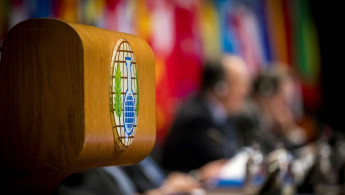Chemical weapons team to identify Syria attacks culprits: OPCW
The team "has initiated its work to identify the perpetrators of the use of chemical weapons in the Syrian Arab Republic", Organisation for the Prohibition of Chemical Weapons (OPCW) chief, Fernando Arias said in a statement to member states issued on Monday but seen by AFP on Friday.
The team would be "identifying and reporting on all information potentially relevant to the origin of those chemical weapons" where their use has previously been identified by OPCW teams, he said.
Arias did not give any details of the team's initial activities or which incidents it would be investigating first. It is able to probe attacks as far back as 2013.
Arias has said the "very small but very strong" team would have nine or ten members.
However Arias said in his statement this week that Syria had sent a letter saying it "would not issue a visa to the Coordinator of the IIT to visit Damascus."
Arias said he had postponed a meeting scheduled for May in Damascus as a result.
The West has called for the new team to quickly start work on identifying the culprits behind a deadly attack in the Syrian town of Douma in April 2018.
The OPCW said in a report on March 2 that chlorine was likely used in the attack, which it said killed more than 40 people. The report however did not apportion blame as it was not in the watchdog's mandate at the time.
Member states of the OPCW agreed one year ago to give The Hague-based body new powers to assign blame for attacks, which Syria and Russia say was faked.
Read more: Monitor says no evidence of new Syria chemical attack
Syria has already blocked access to the chief of the so-called Identification and Investigation Team, while Moscow and Damascus have accused the Hague-based OPCW of becoming "politicised".
Western states pushed through the new blaming powers after a string of chemical incidents in Syria, as well as the 2018 nerve agent attack on a Russian former double in the British city of Salisbury.
Previously the OPCW only had the mandate to state whether or not chemical weapons had been used, without identifying the likely culprits.
Since that decision the OPCW - which won the Nobel Peace Prize in 2013 for its work in destroying the world's chemical weapons stocks - has been finding staff and funding for the new attributions team.
Exporting chemicals to Syria
Meanwhile on Thursday, reports said a German firm was accused of exporting chemicals to Syria that could have been used to manufacture deadly substances such as sarin.
Chemical wholesaler Brenntag AG used a Swiss firm to export chemicals isopropanol and diethylamine to Syria in 2014, an investigation by media outlets Bayerischer Rundfunk, Suddeutsche Zeitung, and Tamedia revealed.
Although they can be used for medical purposes they are also ingredients in the manufacture of deadly chemical weapon sarin, which has been used by the regime on civilian areas in the war.
Brenntag AG sold both chemicals to a pharmaceutical company with links to the Syrian regime.
Read more: Syrian regime Ramadan TV show mocks chemical attack victims, White Helmets
The UN found that a sarin gas attack on the opposition village of Khan Sheikhoun in 2017 - which killed around 100 civilians - used the chemical isopropanol.
Brenntag AG admitted to sending the chemicals to Syria through the Swiss company but said it was done "in accordance with the laws at the time".
The EU put restrictions on the export of chemicals that could be used to manufacture weapons to Syria after a number of deadly gas attacks on opposition areas.
Authorisation is required to export diethylamine since 2012, while a similar law was put in place for isopropanol in 2013 including through subsidiaries in Switzerland.
Prosecutors in Essen said they are taking legal action against Brenntag AG, while prosecutors in Belgium are considering doing the same.
Some of the chemicals were delivered in 2014, when the Syrian regime formally "destroyed" its chemical weapons.
Follow us on Twitter: @The_NewArab





 Follow the Middle East's top stories in English at The New Arab on Google News
Follow the Middle East's top stories in English at The New Arab on Google News
![The UAE is widely suspected of arming the RSF militia [Getty]](/sites/default/files/styles/image_330x185/public/2024-11/GettyImages-472529908.jpg?h=69f2b9d0&itok=Yauw3YTG)
![Netanyahu furiously denounced the ICC [Getty]](/sites/default/files/styles/image_330x185/public/2024-11/GettyImages-2169352575.jpg?h=199d8c1f&itok=-vRiruf5)
![Both Hamas and the Palestinian Authority welcomed the ICC arrest warrants [Getty]](/sites/default/files/styles/image_330x185/public/2024-11/GettyImages-2178351173.jpg?h=199d8c1f&itok=TV858iVg)